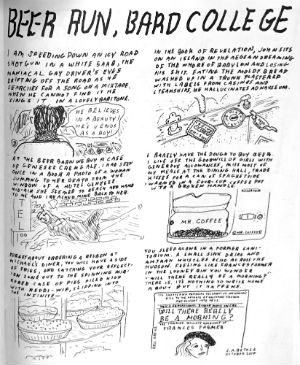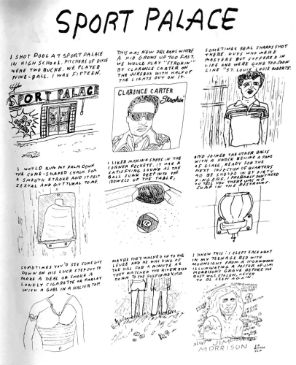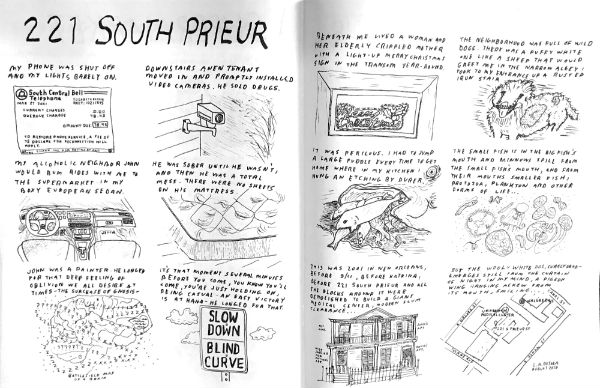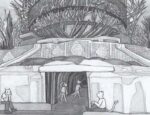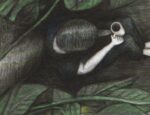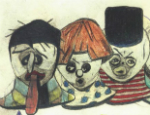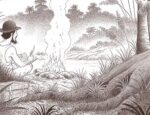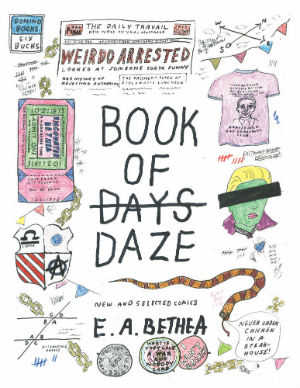 E.A. Bethea’s Book of Daze is a comic wholly unlike any of its 2017 contemporaries. Though Bethea’s scratchy minimalist rendering style and simplistic page layouts can be traced back to the aesthetics of the zine side of indie comics, her voice as a writer is pronounced and singular. Bethea is revelatory in her ability to use the medium to directly evoke the reader’s imagination and emotions.
E.A. Bethea’s Book of Daze is a comic wholly unlike any of its 2017 contemporaries. Though Bethea’s scratchy minimalist rendering style and simplistic page layouts can be traced back to the aesthetics of the zine side of indie comics, her voice as a writer is pronounced and singular. Bethea is revelatory in her ability to use the medium to directly evoke the reader’s imagination and emotions.
This collection of brief and simply constructed visual poems is dripping with a mix of lust and sadness that, while common in prose and poetry, is rarely touched on in comics. The kind of feelings you have buried deep in the private places of your heart until they bubble up to the surface when you are reminded of a past that is now long gone.
Bethea’s combination of loose drawings paired with equally loose but deeply evocative prose is essential to the work’s ability to resonate with the reader. In one scene the description of a down-on-his-luck guy trying to parlay with a girl in a halter top needs only the rough rendering of her torso to guide our imagination. Showing either party’s face would crystalize the moment. In making the choice to be vague Bethea lets the reader dredge up all the times they have been on either side of that scenario.
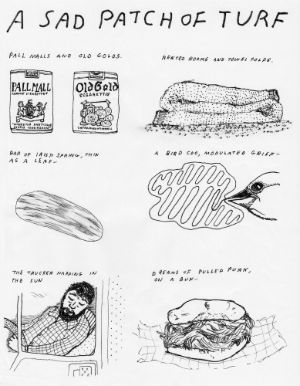 This lack of specificity works equally well in her more romantic vignettes, allowing the reader to conjure their own vision of two lovers in bed recounting their dreams to one another upon waking. A striking usage of this technique occurs when describing a group of fishermen casting their lures into the Chernobyl power plant cooling pool at night. Who is observing this scene? Is this before the disaster or after? Perhaps it is right at the moment of it? Bethea hints but does not say. In focusing only on the fishermen, their catch, and the vodka passed between them, she lets the readers create their own context for this fraction in time.
This lack of specificity works equally well in her more romantic vignettes, allowing the reader to conjure their own vision of two lovers in bed recounting their dreams to one another upon waking. A striking usage of this technique occurs when describing a group of fishermen casting their lures into the Chernobyl power plant cooling pool at night. Who is observing this scene? Is this before the disaster or after? Perhaps it is right at the moment of it? Bethea hints but does not say. In focusing only on the fishermen, their catch, and the vodka passed between them, she lets the readers create their own context for this fraction in time.
Bethea frequently ignores the larger picture in favor of focusing on the minute and low to the ground. One comic recounts a moon-shattering apocalypse but trains its camera on scratch and sniff stickers, pills, tadpoles, and turnips. Objects of importance and desire are always plain and humble. Cardboard caskets and cheap bagels, SpaghettiOs cooked in a broken coffee pot, whip cream pies in a diner, packs of cigarettes, a poster of the bust above Jim Morrison’s grave, an unaffordable book of Nan Goldin’s photos. These are the meager objects of meek lives, but Bethea captures the deep humanity inherent in cherishing them.
The strongest example of this is a two-page comic highlighting all the idiosyncratic details of her pre-9/11 pre-Katrina neighborhood in New Orleans. A world of alcoholic painters, sheetless mattresses, mangy dogs, and year round Christmas decorations that make up what was once people’s homes until it was demolished and paved over to make way for a medical center. Still years later, visions of that lost world emerge from behind the “curtain of night” in her mind to pull her backwards through time towards it. The objects are gone but their memory is stitched into her very make-up.
Book of Daze often deals with this longing for the past but never in a nostalgic way. Her comics frequently invoke both the shared past of time before we all had an email address, and the personal past of her writing lusty four-page love letters as 21-year-old. Like a Tom Waits song it is unclear how much of her tales of train cars and sailors is entirely Bethea’s experience, but it’s not really of importance as her comics aren’t trading on their authenticity. Her story of a 40s college girl’s romantic tryst right out of a modern American novel is less about the character’s experience than it is about Bethea’s fourth wall-breaking personal reflection on her own feelings about this archetypal story. Her biography of Veronica Lake and her descent into obscurity and has such a melancholy to it that it makes it a thematic fit for the rest of the collection.
In subtly drawing the parallels between the sadness of the lives of people long ago and her own Bethea suggests a universal facet of being alive is to be in a state of perpetual loss. Though as she realizes, in the collection’s longest comic about a childhood friend who disappeared and is never found, all we can do is keep the kicking the can down the road. What else is there?
With Book of Daze Bethea firmly establishes herself as a cartoonist. The work is mature in both subject matter and in execution. It is also a strong reminder of the intimacy and immediacy that comics can have. In being so precise as to what parts of her comics rely on the reader’s imagination, she allows them to pour their own emotions into empty spaces. Bringing all that sadness, longing, and desire, however painful, to the surface helps to remind us that we are alive.
E.A. Bethea (W/A) • Domino Books, $6.00
Review by Robin Enrico





